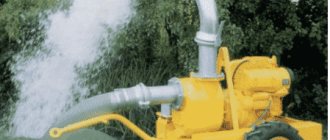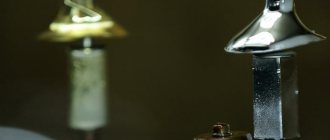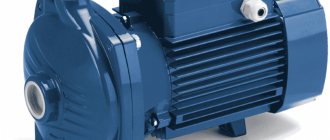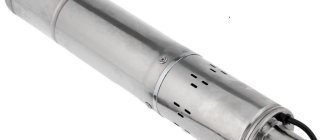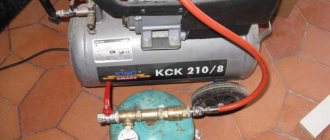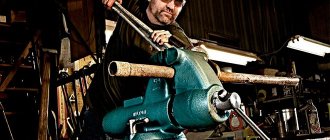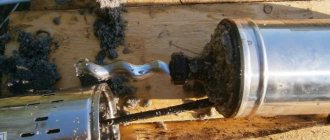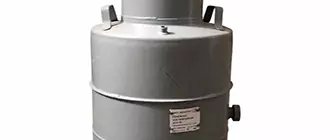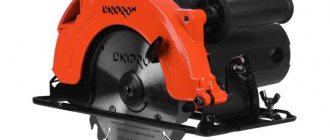Despite the variety of fire extinguishing means, there is a fairly large selection of fire extinguishing agents used to localize and eliminate fires; most often, fighting open fires is carried out using water, foam solutions based on it, supplied under pressure.
One of the effective fire extinguishing means that supplies water or foam is a fire motor pump, which is a pumping unit driven by a gasoline or diesel engine, equipped with a set of fire-fighting equipment.
Fire motor pump
Purpose and advantages
If in cities water is collected by fire fighting vehicles equipped with pumps from the external water supply network, then away from populated areas - from fire reservoirs, reservoirs, and from piers built on rivers, lakes, ponds or process reservoirs.
In the absence of special vehicles in service with federal, municipal, and corporate fire departments in the majority of large industrial facilities and territories of our country remote from regional, regional, district centers; The only available fire extinguishing means used by voluntary, private forces created to fight fire is a fire motor pump - portable, carried manually or on the basis of a car trailer.
For property owners, managers of enterprises (organizations), members of gardening and dacha partnerships who have created a voluntary fire brigade, the purchase and maintenance of firefighting motor pumps is much cheaper than the purchase of special vehicles.
A huge advantage of portable motor pumps is their complete autonomy and high mobility, which allows them to be installed on any solid site near a natural or artificially created water supply that is inaccessible to the access of fire fighting vehicles - tank trucks, pumping hose vehicles.
The main purpose for using firefighting motor pumps is:
- Water intake from fire reservoirs, reservoirs, from specially equipped piers, with subsequent supply under pressure of water or foam obtained using a foaming agent solution to extinguish fires.
- Water supply from hydrants of the external fire water supply network.
- For pumping water, filling containers, adapted for fire extinguishing of agricultural machinery, transportable tank trucks, fire helicopters.
- For equipping firefighting trains and ships.
The benefits of use include:
- Autonomy of devices.
- Mobility, which allows you to quickly deliver them to a fire reservoir, install them, and begin collecting and supplying water without additional preparations.
- Structural reliability.
- Ease of operation, technical service, and repair, which in practice is important for operation in areas far from large cities.
- In practice, fire motor pumps, in addition to work related to fire extinguishing, are actively and effectively used for the following types of work:
- For collecting and pumping water for irrigation of private land plots, fields of agricultural enterprises, for filling various reservoirs and containers.
- For draining flooded basements of construction sites, technical floors, pits, wells when eliminating accidents; construction pits.
In addition, fire-fighting motor pumps are actively and effectively used for the following economic purposes, which confirms the fact that such technical devices have a wider purpose than just fire-fighting use:
- Collection, pumping and supply of clean water for watering gardens, summer cottages, agricultural land, filling containers.
- Pumping of contaminated water from flooded basement floors of buildings, wells for various purposes in the course of eliminating emergency situations in the work of public utilities; drainage of pits, trenches, holds of river and sea vessels.
- For pumping water during search operations and archaeological excavations.
- Emergency drainage, discharge of water from pools, reservoirs, reservoirs.
- When carrying out irrigation work.
Tohatsu VC72AS
This type of fire motor pump is equipped with a two-stroke engine with two cylinders. The total power of the installation reaches 40.8 liters. s., which is not surprising, since the combustion chamber capacity is 617 cubic meters. cm. Such a powerful motor is cooled with water. To operate for 1 hour, it requires 16 liters of AI-92 gasoline.
The energy released by the engine is transferred to a single-stage turbine-type pump. Its pressure varies from 40 to 100 meters (from 4 to 10 kgf/cm2) in increments of 20 meters (2 kgf/cm2). Liquid flows in through a hole with a diameter of 10 cm. The outlet hole is noticeably narrower - only 6.6 cm. Self-suction of water is possible from a depth of up to 9 meters.
The pump housing installed in this motor pump is made of a corrosion-resistant aluminum alloy. This solution made it possible to reduce weight while simultaneously extending the service life. Unlike steel analogues, the installation can even pump sea water.
It will find application on merchant and passenger fleet ships and at their mooring sites. If suction is for some reason impossible, a special screen will show a message about this.
As the manufacturer states, the water used to cool the engine is cooled, then returned, and therefore does not harm the environment. Engineers managed to solve the problem of starting the pump in any weather conditions.
If suddenly the power plant overheats for any reason (the temperature has reached 89 degrees or more), then at the command of a special sensor it stops . The capacity of the fuel tank ensures that the pump operates at maximum intensity for 1 hour. The pipe through which water is discharged out can rotate at an angle of 90 degrees.
Types, types and description
Types of motor pumps
All such mobile devices for extinguishing fires can be divided into types according to the method of placement, movement/transportation, type of pump drive motor; purity of water with which they can work:
- Gasoline - driven by a carburetor/injection engine that uses various brands of gasoline as fuel.
- Diesel - driven by a diesel engine unit, which have a higher engine life, but are louder than gasoline models of devices.
On the Russian market, Tohatsu domestically produced Vepr high-pressure diesel devices Koshin with gasoline-powered engine units manufactured by Honda .
- Portable, mobile. The first ones are mounted on a supporting frame, which provides the ability to: be carried by two people manually, for transportation by vehicle in the back, trunk, or trailer; loading/unloading, installation on a hard surface - dense soil in a fire break near a reservoir, asphalt, concrete surface of a road, fire driveway.
The latter are installed on the frame of a single-axle trolley with wheels, which allows one person to move it on a flat hard surface, but does not exclude the possibility of carrying it by two or more members of the police department, employees from the duty personnel of enterprises and organizations.
Handles on the frame of portable and mobile devices must be protected with heat-insulating material.
- Trailed. This type of firefighting motor pumps is installed on the frame of car trailers, in accordance with their carrying capacity, equipment standards/rules, and cargo transportation. It is trailed motor pumps that are often additionally equipped with devices for dosed supply of a foam solution, which allows the use of guns and generators to extinguish a fire with foam. It is recommended, if necessary, to use all available trailed and portable models of devices, because this provides more opportunities to provide access to the fire.
- High-pressure (high pressure). According to GOST 53332-2009, motor pumps used to extinguish fires, depending on the design and main technical parameters, are divided into normal pressure devices - up to 2 MPa, and high pressure devices - above 2 MPa.
If for extinguishing, according to regulatory requirements, the inclusion of solid particles in water should not be more than 0.5%, and their size should be up to 3 mm, then a fire motor pump for dirty water, purchased for use by utilities, engineering services of enterprises, construction contractors for pumping, draining basement floors, wells, trench pits, allows, by selecting a membrane pump type, the device to collect and pump water with large inclusions - up to 25 mm or more for some product models.
Portable installation
Its main purpose is the same as that of stationary options. But an important feature is the ability to move to another place (with connection to a fire reservoir). Such equipment is used not only when extinguishing fire, but also when draining flooded buildings, dungeons, and lowlands.
When choosing a portable motor pump, you need to pay attention to the following factors:
- overall pump performance;
- engine power;
- size of the device;
- amount of fuel consumed.
For both stationary and portable motor pumps, their running-in regime is of great importance. The essence of this procedure is to ensure that the outer surfaces of the parts get used to each other. At the same time, all burrs and small roughness are removed.
The total running-in duration is limited to 30 hours; more detailed information can be found in the accompanying documentation. It also indicates what fuel and lubricating oil is permissible to use, what pressure inside the fire pump can be set.
Device
The design of a fire motor pump, depending on the type, includes:
- Rigid frame for manual carrying, trailer chassis.
- An engine that consumes different brands of liquid petroleum products.
- Centrifugal, diaphragm, membrane pump that takes in and supplies water and an aqueous solution of firefighting foam concentrate.
- Tank for liquid petroleum products.
- A tank for storing fire-fighting foam concentrate with a dosing system for its supply.
- PTV kit.
- Main characteristics
- Such mobile fire extinguishing devices are characterized by:
- Productivity.
- The height of the supplied water column.
- Dimensions, weight of the device assembled with the PTV set.
- Power of the motor unit.
- Type of liquid petroleum product consumed.
The fire motor pump must ensure uninterrupted operation during a fire for 2 hours at temperatures from +40 C° to −45 C°. With the help of these mobile fire extinguishing devices, simple in technical composition, unpretentious in conditions of long-term operation, including in harsh weather conditions, a huge number of fires and fires have been eliminated.
In remote regions, districts, and isolated facilities - from industrial, warehouse, agricultural enterprises to tourist centers, sports camps, fire motor pumps serve as affordable, reliable fire extinguishing means that are easy to use when installed near the nearest water source.
Model MP-600 “Virgo”
Despite such a romantic name, this product has a number of advantages:
- high reliability of the design;
- low fuel consumption;
- cooling the engine with air flows;
- excellent resistance to stains;
- easy start;
- high pumping capacity.
The attractive technical characteristics are largely due to the high-quality manually operated piston pump. It is capable of pumping water from a depth of 7.5 meters.
The shaft seal along the axis and at the end is designed to minimize the need for maintenance. All pump connections are made in accordance with Russian GOST. The engine is started using non-contact transistor ignition; pressure lubrication is provided.
At the customer's request, this motor pump can be equipped with:
- electric starter;
- mesh that prevents dirt from being absorbed;
- non-standard adapters;
- spotlight.
A single-stage centrifugal pump with a suction height of 3 meters can supply 10 liters of water in 1 second.
The dry weight of the device is 58 kg. After refueling, it grows to 66 kg.
The total power of the engine, receiving fuel from a tank with a capacity of 8.5 liters, reaches 18 liters. With.
Pumps for motor pumps
According to GOST 17398-72, a pump is a machine for creating a fluid flow. Fire pumps included in motor pumps are of two types:
- Centrifugal , in which the liquid is moved by a wheel with blades from the center to the walls of the working chamber, which creates the necessary pressure. This is the main type of pump used for installation on fire fighting vehicles intended for collecting, storing, pumping and supplying water for extinguishing, ensuring high performance of the fire motor pump.
- Diaphragm or membrane . These are reciprocating devices with working elements in the form of elastic membranes that bend under the action of a mechanical drive. Motor pumps with this type of pump are capable of collecting, supplying, and pumping out both clean and heavily contaminated water, without significant loss of performance, which increases their value for customers.
How does it work?
The technique works according to a certain algorithm.
- The diaphragm or impeller is driven by a motor.
- In a rarefied environment, water fills the hose (self-priming system), then flows into the pressure pipe.
- The autonomous engine system makes it possible to work without power supply. Accordingly, the equipment can be used for irrigation, water supply, fire extinguishing, etc.
Motor pumps differ in their performance. Water supply can be carried out within a radius of hundreds of meters. Such pumps are indispensable in the household.
Water rises horizontally and vertically. The calculation is as follows: 1 meter of vertical rise of water per 10 meters of its horizontal direction.
Sleeves for motor pumps
Depending on the manufacturer, product model, they are equipped not only with pressure-suction, pressure hoses, barrels, but also with suction filters, screens, foam generators and other components necessary to solve problems.
Fire hoses included in fire engine pumps must be equipped with connecting heads.
For portable, mobile motor pumps with low productivity and relatively low water pressure, the set of fire-technical equipment, as a rule, includes hoses designed for a pressure of 1 MPa, designed for connection to fire hydrants, in accordance with the requirements for fire cabinets; and trailed models of devices are equipped with hoses for fire fighting vehicles with a pressure of 1.6 MPa.
To extinguish forest fires
The small-sized mobile motor pump “Mini-Stryker” is well suited for solving this problem. Despite its small dimensions, it provides high pressure. Such an attractive combination of properties allows you to quickly deliver the unit to the scene of an incident and effectively suppress even a strong fire.
Typically used for fire extinguishing systems have an unjustified tilt in one direction or another. Thanks to low fuel consumption, it is possible to extinguish fires lasting over 1 hour continuously.
The developers took care to prevent engine deformation due to a drop in the oil level in the crankcase. There is a special sensor that detects its excessive loss. This solution increases the pump usage time by 15% compared to analogues. The pump parts themselves are made of aluminum alloy and are additionally anodized. The pump system can be used not only for fire protection, but also for purely domestic purposes.
Requirements
The basic requirements for motor pumps are set out in Art. 110 “Technical Regulations on Industrial Safety”:
- Fire motor pumps are used to supply water to the site of a fire, taking it from external water supply networks, reservoirs or open sources - lakes, ponds, rivers, lakes; providing the required flow rate, operating pressure when supplying water, foam necessary to extinguish the fire.
- According to their design and total weight, portable fire apparatus must allow two people to carry it manually and install it on a hard surface.
- For towing devices, rigid stationary fastening must be provided on trailers, the design of which must ensure transportation safety and stability during installation.
Requirements for structural elements of products and equipment included in their package:
- NPB 313-2002, GOST 53332-2009 – about fire motor pumps.
- NPB 176-98 – about centrifugal fire pumps.
- NPB 152-2000, GOST R 51049-2008 – on pressure fire hoses.
- NPB 177-99* – about hand-held fire nozzles.
Summing up, we can say with confidence that such mobile, autonomous devices for extinguishing fires, especially far from large populated centers, in rural areas, taiga wilderness, will reliably serve people for decades to come.
Features of operation
All water pumping fire extinguishing devices are supplied with operating instructions. They describe how to store, install, and clean the unit for uninterrupted reliable operation, what breakdowns are possible and how to eliminate them, and what lubricants the manufacturer recommends. Unless otherwise specified in the documentation, pumping sea water, aggressive chemical substances, or waste oil with a fire motor pump is not allowed in order to avoid damage to the pump and failure of the unit.
Install the pump on a free, level area with a hard or loose surface. The trailed motor pump is detached from the towing vehicle by installing support shoes under the trailer wheels.
General PN schemes
General information about firefighter pumps is offered by the following diagrams:
Volume units:
Positive displacement pump diagram
Centrifugal pumps:
Centrifugal pump diagram
Subtypes of volumetric fire pumps may differ in design, but in general their functionality is identical.
Volumetric modification
Fire truck PTV classification
Tools used during a rescue operation are an essential component of any type of fire truck. They are divided into two groups:
- By type of drive – manual mechanized and non-mechanized tools;
- By functional purpose - for punching holes, for cutting, lifting, moving and fixing structures, for opening metal structures.
Mechanized PTVs include devices with electric, motor, pneumatic and hydraulic drives. For non-mechanized ones - a classic working tool.
Purpose of the hand tool:
- scrap - opening floors, dismantling partitions, roofing, dismantling well covers;
- all-metal hooks - clearing the fire site, opening the ceiling lining;
- mounted hooks - dismantling log walls, pulling away stacks of hay;
- ax - opening doors, windows, cutting boards blocking the passage;
- light hook - opening the floor, iron roofing, ceiling sheathing, removing plaster;
- shovel - excavation at the fire site, clearing the room from burning bulk substances, backfilling the floors;
- scissors – dismantling low voltage electrical wires.
Mechanized tools include gas-powered saws, electric hammers, and autogenous cutting units.
Structural characteristics
As noted above, the base in the form of a motor and a pump can have a different type of frame. In its simplest form, it is a reliable frame metal structure that protects components and assemblies from strong vibrations. A closed case provides a greater degree of protection, but in this case access to the same mechanisms becomes more difficult if repairs are necessary. The fire motor pump is also provided with a fuel tank. This tank should be considered not only as a mandatory addition to the power unit, since its capacity determines the ability of a particular model to operate without interruptions for refueling. A fairly long operating interval is provided by motor pumps with a tank of up to 6 liters. The characteristics of the outlet, that is, the socket through which water passes through the pump, also matter. Typically this parameter is 10 cm, which is enough to ensure average performance with good pressure.
Korean devices
The Hyundai HYH 50 gasoline pump can also be used for firefighting purposes. The manufacturer provides a one-year warranty on it.
The maximum minute output is 500 l. The kit includes only original motors from the Korean concern. The body is made of durable aluminum. Thanks to three outlets, it is possible to use the pumping unit in normal or high-pressure mode.
Technical parameters of PN
The classification of fire pumps assumes that each type of device has certain technical characteristics. When choosing a model, you should consider the following performance characteristics:
- working supply of fire extinguishing agent;
- operating pressure;
- foam former dosage level;
- power in operating mode;
- highest feed;
- efficiency parameters;
- cavitation reserve;
- temperature range of the working environment;
- maximum sizes and concentrations of solids;
- operating speed of the drive shaft;
- the time it takes for the pump to fill with the working medium;
- dimensions and weight;
- equipment.
The operation and maintenance of a fire pump require a certain procedure. Failure to comply with the requirements increases the risk of malfunctions, loss of performance and premature depletion of the resource.
Working with the pump
Evacuation equipment
The initial task of the rescue team is to evacuate people and material assets from the fire-affected area. In addition to the available tools listed above, a hydraulic rescue tool is of great importance in the successful outcome of an evacuation operation. These are portable complexes with hydraulic drive, which are used to release victims during emergencies.
General purpose PA vehicles are equipped with:
- 2-4 expanders or clamps to change the size of the passage;
- hydraulic pumping station or hand pump;
- hydraulic lines;
- a jack for lifting heavy obstacles on the evacuation route;
- wire cutters for cutting metal and combined type scissors;
- an additional tool that removes obstacles along the way.
The operating principle of a hydraulic rescue tool is based on driving a pump (manual or electric).
Tractor trailer systems
A striking example of such fire-fighting installations are the Geyser MP-40/100 motor pumps. There is an option with a reservoir for foam extinguishing.
Compared to conventional motor pumps, this technique:
- gives stronger pressure;
- Provides solid performance;
- quite reliable;
- comfortable for everyday use.
Thanks to these characteristics, MP-40/100 pumping systems are often used as fire stations in warehouses of flammable materials and gas stations. The use of such systems in hard-to-reach areas, including the Arctic, is allowed.
The ground clearance of the motor pump is 44 cm. At the same time, it can move at speeds of up to 30 km/h. The transportable foam concentrate stock is 200 kg.
Robin PTG (subaru)
From us you can buy or order spare parts for motor pumps made in Russia and Japan!
Floating motor pump
Floating motor pumps are designed for heavily polluted water. After floods and other emergency disasters, reservoirs are heavily polluted and contain a lot of sand, clay, dirt, small crushed stone and other abrasive material that can interfere with the operation of the motor pump and lead to premature failure of the pump and other components. Under such conditions, motor pumps wear out faster when pumping contaminated water. Using a conventional filter can lead to various pump failures. Its subsequent repair costs a lot of money and labor, although all this can be prevented with the help of this small device. The use of a floating mesh prevents serious damage to the pump when pumping water in places where the water level is not high and sucks in various unnecessary particles. the pump can be used up to a water level of 2-3 cm to the bottom. Engine with a capacity of 2700 liters/min.
Floating mesh
The floating mesh AMPHIBIO ZHT, made in the Czech Republic, is designed as an additional accessory for floating motor pumps and other portable pumps for dirty water and fire trucks for collecting water in forests and swamps. Shallow ponds, peat bogs and other bodies of water where particles can get into the pump, with a floating mesh can be an excellent water intake. Floating particles, debris on the surface of the water, and silty soils are no longer a problem. Also, the AMPHIBIO suction mesh is effective for pumping out water in case of flooding. A depth of 1.2 - 1.5 cm is sufficient for water intake.
The suction mesh filter prevents dirt and other debris from entering the pump, thereby protecting it from damage. The mesh design consists of two parts: 1 - a floating part and 2 - a rotating suction chamber. The rotating part compensates for the load from the weight of the suction hose in such a way that part of the element always remains straight on the surface of the water. The suction grid is self-adjusting to the water level; whirlpools or suction do not have any effect on its operation.
